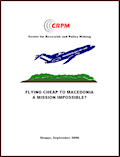

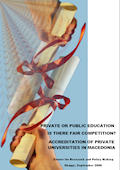
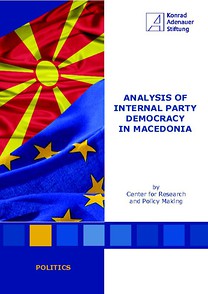
This research study conducted by the Think Tank Center for Research and Policy Making (CRPM) in cooperation with various Macedonian authors deals with the topic of Internal Party Democracy in the Republic of Macedonia. It examines, describes, and compares the intra-party democracy in some of the bigger political parties in the Republic of Macedonia, in order to provide a basis for the development and consolidation of democratic structures and the possibilities for their members’ participation. (Publisherd in co-operation of CRPM and the Macedonian office of the Konrad Adenauer Foundation)
More...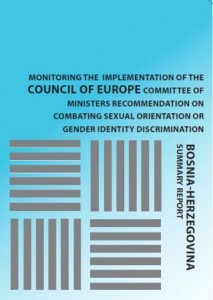
Keywords: implementation monitoring; Council of Europe Committee of Ministers; SOGI Discrimination; BiH;
The only measure taken by Bosnian-Herzegovinian authorities in compliance with the Recommendation CM/Rec(2010)5 is the inclusion of sexual orientation and sexual expression in anti-discrimination legislation. However, in the absence of other measures, and in the face of severe social hostility, it offers little protection to lesbian, gay, and bisexual persons. So far as the Sarajevo Open Centre has been able to ascertain, the authorities have adopted no other measures to implement the requirements of the aforementioned Recommendation. In particular, there has been no review of existing legislative and other measures that could result directly or indirectly in discrimination, no provision for protection from discrimination on grounds of gender identity, and no introduction of a comprehensive strategy aimed at tackling discriminatory attitudes within the general public and correcting prejudices and stereotypes. The Recommendation and its Appendix have not been translated, and have not been disseminated either within government or civil society. A bias motive based on sexual orientation (but not gender identity) is included as an aggravating circumstance in the criminal codes of the Republic of Srpska and Brcko District, but not in that of the Federation of BiH. There appears to be no specific training for police officers and judiciary in relation to homophobic or transphobic hate crimes, nor for prison officers in relation to LGBT prisoners. There is no collection of data in this field. There are no laws prohibiting “hate speech” or incitement to hatred on grounds of sexual orientation or gender identity (including on the Internet) Although freedom of expression and assembly exist in theory for LGBT people, the violence at the time of the Queer Sarajevo Festival, and the failure of authorities to provide protection, demonstrate that the reality at that time was very different. How far things have improved will only be tested when the LGBT community gains the confidence to try to exercise freedom of expression and assembly fully again. Same-sex sexual acts are not criminalised. No steps have been taken to remove discrimination in access to rights of couples and parenting. Once gender reassignment is completed, the individual can apply for changes to the gender marker in all official documents including, as a first stage, the identification number. Therefore at least one abusive requirement, that of gender reassignment surgery, exists. The Labour Law of the Brcko District and Labour Law of the institutions of BiH prohibits sexual orientation discrimination, but equivalent legislation in the Republic of Srpska and the Federation of BiH does not. It appears that none of the other measures proposed by the Recommendation have been taken, including in relation to the armed forces, and the privacy of transgender persons. The BiH Anti-Discrimination Law, and some legal instruments at entity level, specifically prohibit sexual orientation discrimination in education, but it does not specifically include gender identity discrimination. It appears that no other measures proposed by the Recommendation have been acted on. A study of school textbooks found that some still define homosexuality as an illness and include it group of disorders such as paedophilia and drug addiction. Homosexuality is no longer classified as a disease, HIV/AIDS prevention programme includes LGBT people, and there is nothing in principle that would prevent LGBT persons identifying their partner as “next of kin”. However, it seems that other measures proposed by the Recommendation have not been carried out. The BiH Anti-Discrimination Law prohibits discrimination in the field of housing on grounds of sexual orientation, but it does not specifically include gender identity. Apart from this, there is little suggests that any steps have been taken to address the other measures proposed by the Recommendation None of the specific measures proposed by the Recommendation have been implemented in the field of measures to prevent discrimination in the field of sports. BiH law does not explicitly recognise sexual orientation or gender identity in the context of asylum. No action has been taken in relation to the measures proposed by the Recommendation. The mandate of the Ombudsman for Human Rights explicitly includes sexual orientation but not gender identity. However, the Ombudsman has included gender identity in the work of the/ Office, and has, within the limits of his resources, conducted some activities along the lines proposed by the Recommendation. However, due to lack of resources, the Ombudsman’s office does not carry out extensive public campaigns in order to promote anti-discrimination on grounds of sexual orientation and gender identity.
More...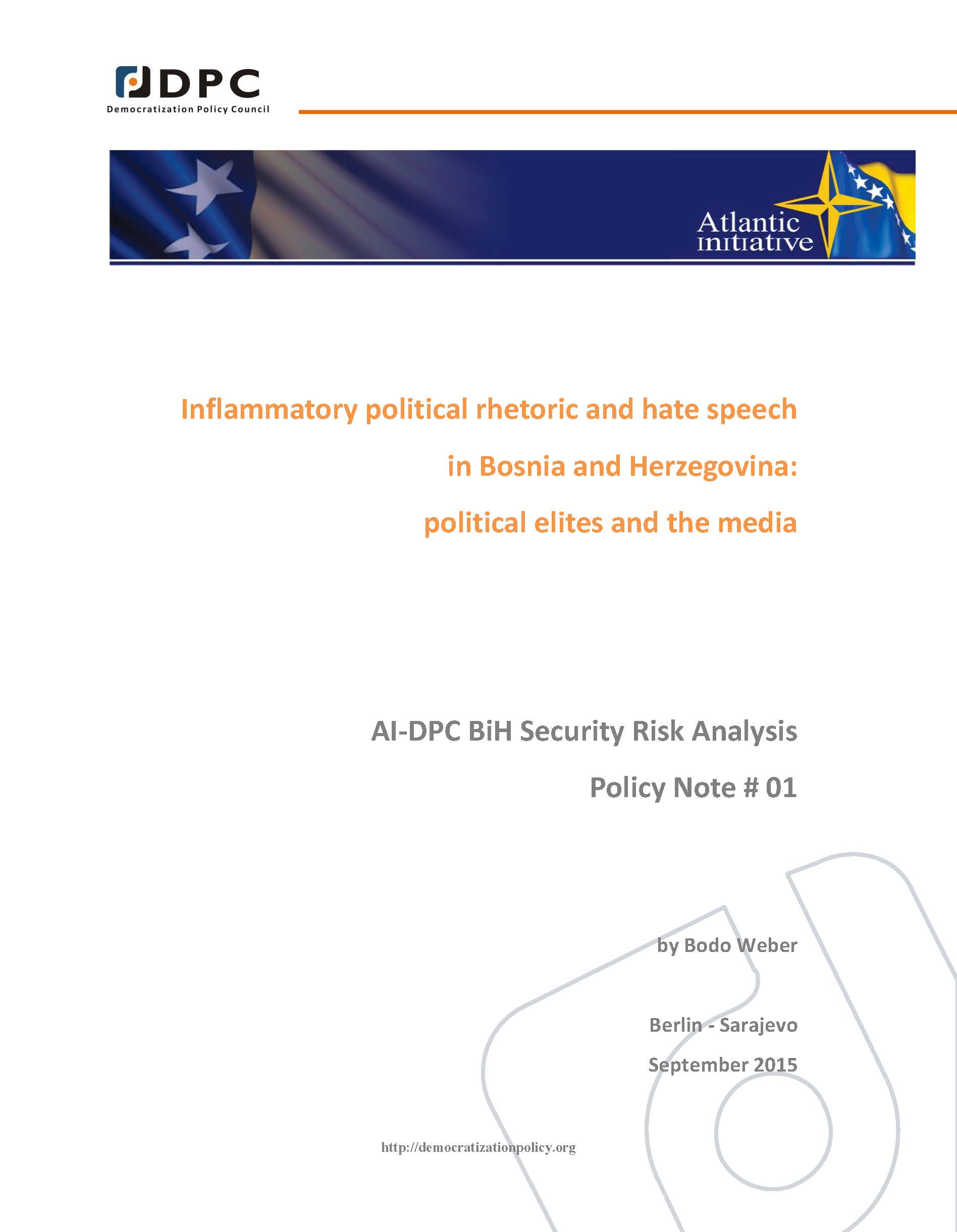
Keywords: BiH; political rhetoric; hate speech; political elites; media; local elections; 2012; general elections 2014; Islamist terrorism; Zvornik; police station; social unrest; EU;
Since the international retreat to an “ownership” and EU enlargement-based policy toward Bosnia and Herzegovina (BiH) a decade ago, political rhetoric in the public space, propagated through the media, has become more polarizing and inflammatory. The pronounced nationalist themes articulated by politicians and their adjuncts, revolving around the future of the state and alleged threats posed to ethnic collectives by adversaries both domestic and foreign (and their supposed local allies), have radicalized the public discourse and contributed to an ambient of fear and homogenization. The topic of “war” has returned to popular discussion. This phenomenon has been observable in media coverage of the 2012 municipal elections, 2014 general elections, issues and events relating to Srebrenica, acts of Islamist terrorism, and popular protests of February 2014. In each instance, political leaders, dubious “experts,” and commentators have all fed a dynamic which could have dire consequences in BiH’s current rules-free environment – effectively generating volatility which could ignite by design or by accident. And while all those with unfulfilled agendas are pursuing them without restraint to form perceptions and opinions in the media arena, the most consistent and radical messaging is emanating from the Republika Srpska Government, and President Milorad Dodik in particular. While BiH politicians define the agenda, the politically captured media provides the means to inflame, intimidate, provoke anger, and stoke fear. This information dominance is a vital element of the BiH political elites’ life support system.
More...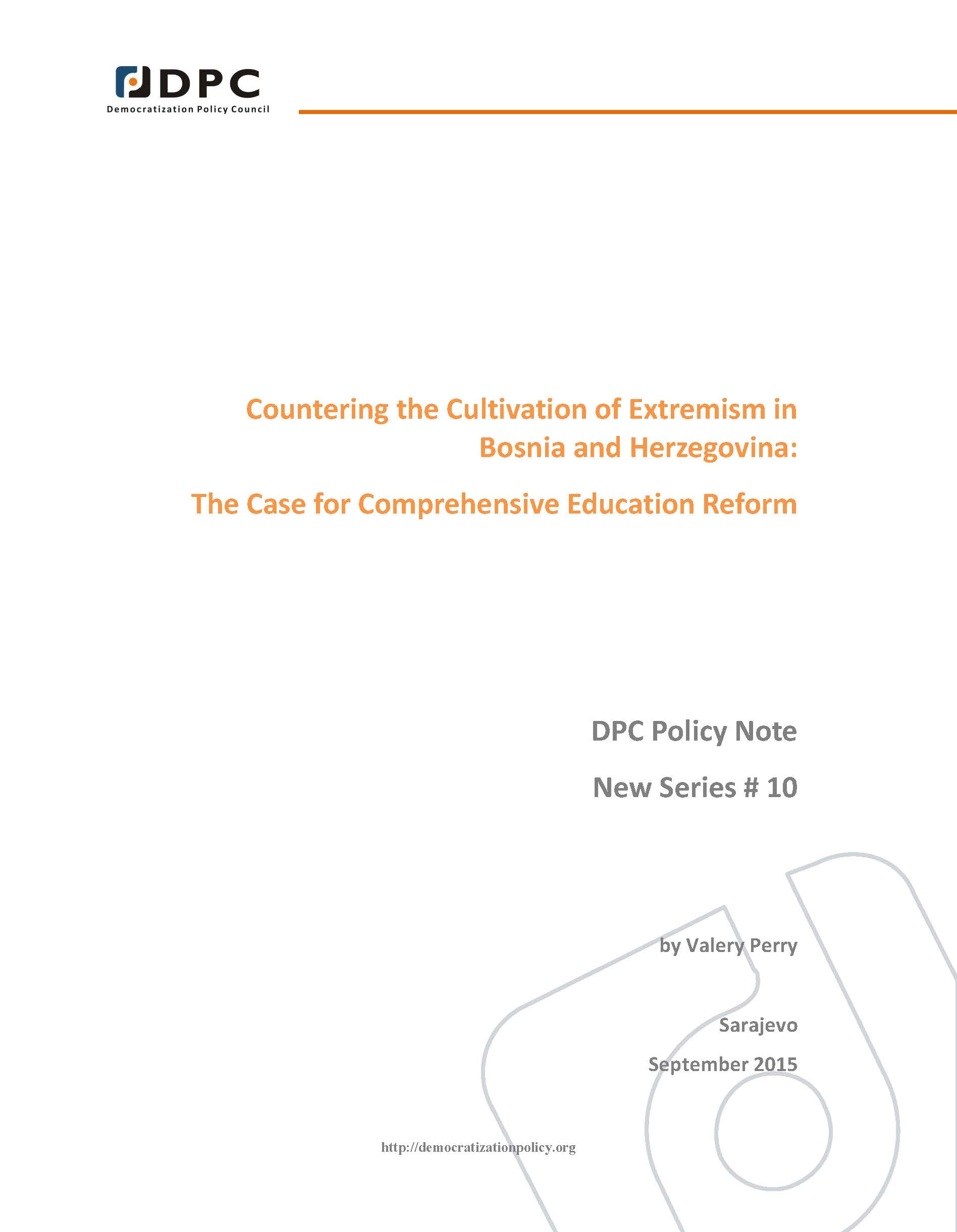
Keywords: BiH; extremism; cultivation; education; reform; educational policy; youth; ethnicity; fragmentation; critical thinking; analytical skills; media literacy; Balkans; Syria; Iraq; Ukraine; post-war;
This policy note argues that while educational policies in Bosnia and Herzegovina (BiH) do not explicitly encourage radical or extremist thinking, they do decidedly facilitate the emergence of narrow-minded, ethnically exclusive groups of young citizens unequipped to operate in a heterogeneous, complex world. Insufficient measures exist to promote critical thinking, media literacy, multiperspectivity and inclusive civic-mindedness. At best, the present educational approach bodes poorly for the socio-economic prospects of BiH’s youth in an increasingly competitive global market; at worst, few preventive measures exist that would dissuade vulnerable individuals from gravitating towards extremist worldviews. BiH’s ethnically fragmented and exclusivist approaches to education are anathema to the development of critical thinking and analytical skills necessary to open young minds, reduce intolerance and question the ethnic status quo narrative. While global fears of Islamist extremism dominate discussions on radicalism and terrorism, other forms of extremism (radical nationalist; white supremacy; neo-Nazi; anti-immigrant; etc.) benefit from young minds unable to effectively digest and question messages of hate and intolerance. Young people from the Balkans have gone not only to Syria and Iraq, but also to Ukraine, as part of a perceived ideological, cultural struggle.
More...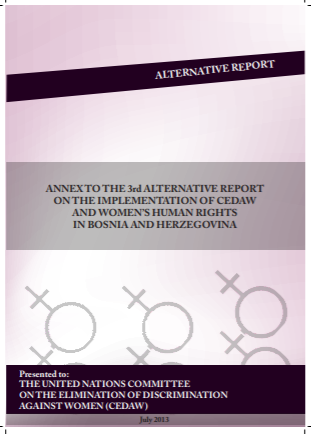
Keywords: CEDAW; CEDAW convention; women human rights; BiH; alternative report; annex; economic position; political life; violence; victims of war; women trafficking; marginalisation; women from rural areas; LBT;
(English edition) The Annex to the Third Shadow Report is a result of joint efforts invested by the group of experienced female and male activists of non-governmental organizations in Bosnia and Herzegovina with a long experience in working with women whose rights are either threatened or directly violated as well as in advocacy of the adoption of gender sensitive and gender responsive legislation and policies in the field of women’s human rights and gender equality.
More...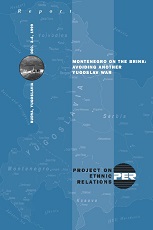
Keywords: Montenegro independance;
Montenegro is a small republic—with a population of 635,000—which, together with Serbia, makes up today’s Federal Republic of Yugoslavia. It is at a crucial moment: the present government leadership is considering how to re-define its fundamental relationship with Serbia. On December 3-4, 1999 the Project on Ethnic Relations (PER) organized a meeting in Budva, on Montenegro’s Adriatic coast, about the status of Montenegro in Yugoslavia. Some 40 leading officials and policymakers from Montenegro, Albania, Croatia, Bulgaria, Macedonia, Romania, Bosnia and Herzegovina, Hungary, the United States, Italy, the OSCE and the United Nations, as well as from the Serbian democratic opposition, participated. They addressed Montenegro’s relationship with Serbia, its role in the western Balkans, and how Montenegro is managing interethnic relations, especially with its Albanian minority. The tenor was one of cautious candor, with an emphasis on positive accomplishments. Indeed, the uncertainty and lack of unanimity that characterized reactions to political developments in Montenegro reflected the open nature of the dialogue.
More...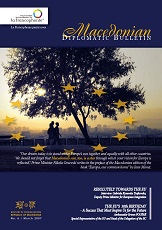
Keywords: North Macedonia; European Union; EU integration process; diplomacy; governance;
More...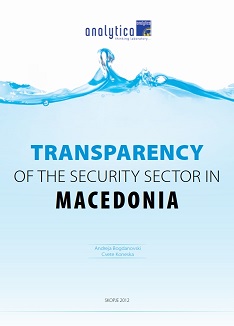
Keywords: North Macedonia; security sector; transparency; access to information of public importance; protection of private data; protection of classified information; public administration;
The main finding of the research suggests that, normatively speaking, all three areas (access to information, protection of classified data and protection of personal data) have appropriate laws which are further operationalised into secondary legislation and that there is no major disharmony between them. A feature of all three is the establishment of commissions/directorates tasked with following the implementation of the laws. As such they report irregularities and act upon them while affirming the benefits of these laws and the obligations of security institutions among the wider public. All have adequate competences which give them solid ground to monitor and act upon irregularities. In practice, sanctioning remains sporadic as a result of the novelty these legal solutions bring. In the case of free access to information, the time required for full adoption and recognition of this public right by state institutions has been considerable. A possible role model is the Directorate for Security of Classified Information, where regular inspections are taking place.
More...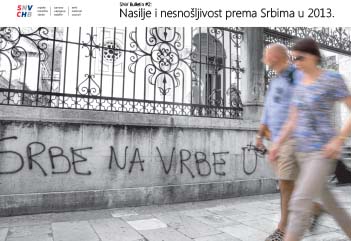
Keywords: violence against Serbs;
The analysis that follows certainly calls into question the soundness of a generalized assessment made by the Croatian authorities of the years 2011 and 2012, specifi cally that “[ ... ] in the Re public of Croatia there is no increased threat to members of national minorities” and that “[ ... ] there were no identifi ed elements which would indicate that there is organized violence against members of ethnic minorities, but in all cases individual incidents were recorded, which do not indicate a threat to national minorities in a certain area or during a certain time period.” Specifi cally, during 2012 the caucus of the Independent Democratic Serb Party (SDSS ) in the Croatian Parliament and the Serb National Council (SNV) received information about an increased number of cases of ethnically motivated violence and intolerance towards members of the Serb community and their institutions.
More...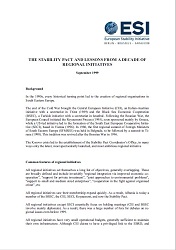
Keywords: Gjilan; Kumanovo; Preshevo; Kosovo; South-Serbia;
ESI has spent the past year studying economic trends in the region and looking for development potential. Most of the news is bad. Only a handful of the old socially owned enterprises have made a successful transition to private ownership. The new private sector is small in scale, dominated by shops, cafés and basic services, and can absorb only a fraction of the labour shed by industry. Commercial agriculture is on the decline, and family farms do not produce the revenues for reinvesting in machinery. We estimate that no more than 33 percent of the working-age population are employed, compared to the EU average of 63 percent. This is the development trap at the heart of the Western Balkans. Regions with this economic profile are not attractive to private investors. Nor do they generate significant revenues of their own to support public investments in development. Unless there is a concerted effort by central governments and their international partners to invest in overcoming the barriers to economic growth, the region will continue to fall further behind.
More...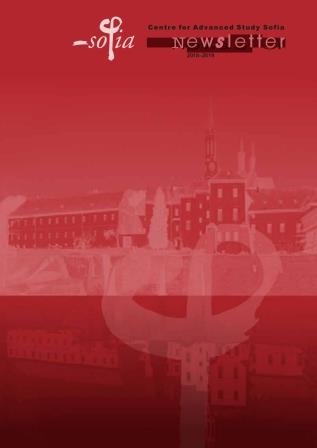
Keywords: Centre for Advanced Study Sofia
Articles, pictures and interviews can be reprinted only with the consent of the Centre for Advanced Study Sofia
More...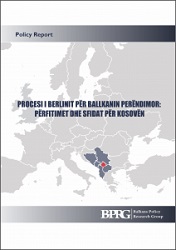
Keywords: Western Balkan; Berlin Process; regional cooperation; transport; Civil Society;
The Berlin Process is a German-led European initiative whose goal is to facilitate regional cooperation between the Western Balkans Six (WB6) countries – Albania, Bosnia and Herzegovina (BiH), Kosovo, Macedonia, Montenegro and Serbia – with a view to help them fulfill criteria to join the European Union (EU). Launched by German Chancellor Angela Merkel in 2014, its most important component is the so-called “Connectivity Agenda”, which first aimed to link the WB6 together in the fields of transport and energy, and later expanded into youth exchanges and economic connections. Summits in Germany, Austria, France and Italy helped establish communication between Balkans leaders, and design several infrastructure projects and new regional initiatives. Yet, ahead of the next 2018 Berlin Process Summit in London, many pressing issues remain intact, and cooperation between WB6 governments has not improved much.
More...
Keywords: slogans;campaign themes;evaluation of political leaders;party evaluation;electoral behaviors;
The research was conducted in September 2018 based on 3 focus groups in which 28 people participated. The study aimed to evaluate the perception of the Dăncilă government, the evaluation of President Klaus Iohannis, Traian Băsescu, Eugen Tomac, Ludovic Orban, Dan Barna, the perception of PMP, PNL, USR, PSD, of the topics that will be debated in the campaign for the European elections. political relations, attitude towards the PMP, intention to vote for referendums on issues such as: no criminals in public office, the union of Moldova with Romania, electronic voting.
More...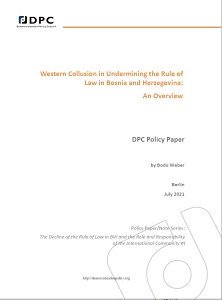
Keywords: legal development in Bosnia and Hercegowina;
Three legal cases/political scandals during 2018-19 grabbed the attention of the domestic public and the international community in Bosnia and Herzegovina (BiH). The first two concerned the unresolved deaths of two young men, Dženan Memić in Sarajevo and David Dragičević in Banja Luka. The improper investigative conduct of the police and judiciary regarding their deaths raised suspicions of cover-ups and political interference. The third concerned corruption allegations against Milan Tegeltija, then president of the High Judicial and Prosecutorial Council of Bosnia and Herzegovina (HJPC), the BiH judiciary’s self-managing body. The three cases marked the nadir of a steady decline of the rule of law institutions in BiH over the last decade and a half, and stand in stark contrast to 2005 when BiH was a frontrunner among Western Balkan countries aspiring to European Union (EU) membership. Rule of law achievements until then had been the result of substantial and systematic judicial and (to a lesser degree) police reform carried out during the immediate post-war period under the leadership of the international community. This paper serves as an introduction to a policy paper/note series entitled “The Decline of the Rule of Law in Bosnia and Herzegovina and the Role and Responsibility of the International Community” that constitutes a central component of a project launched in 2019 by the Democratization Policy Council (DPC) with the support of the Heinrich Böll Foundation office in Bosnia and Herzegovina. It is aimed at initiating a dialogue among Western diplomats and officials on the international community’s co-responsibility for the decline of the rule of law in BiH – with each subsequent paper covering one of the key episodes stated above – focused on how the damage done can be repaired, and how international actors can contribute to a re-strengthening of the rule of law institutions in BiH.
More...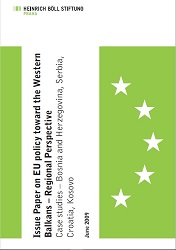
Keywords: Western Balkans and EU; Ethno-politics; conditionality;
There is no doubt that the states of the Western Balkans belong to the European Union. However, their road to the EU is by no means an easy one. The entire Western Balkan region is not only encumbered by the maladies related to its communist past, but also by the problems the region has more recently experienced due to the horrors of war. Many of the ethnic tensions have not yet cooled down. The EU is more sceptical of further enlargement now than it was prior to the large-scale enlargements that brought in the states of Central and Eastern Europe in 2004 and 2007. The current EU-27 finds consensus more difficult to reach among states that are more different politically, economically and culturally than ever before. The EU, therefore, is not hastening the next wave of enlargement. It would be a big mistake, however, for the EU to close its doors to the states of the Western Balkans. The promise of EU accession is the most reliable driver of reform and stabilization for these potential new members. One of the foreign policy priorities of the Czech EU presidency was indeed continuing accession talks with the Western Balkan states. // In this publication we offer you an overview of the situation from the perspective of experts from four Western Balkan countries: Bosnia and Herzegovina, Croatia, Kosovo and Serbia. You are about to read a text which is in many ways significantly critical both towards domestic conditions in these countries and towards EU policy on the Western Balkan region, thanks to which you will have the opportunity to probe deeper into the problems of this region, which decidedly should not remain in the background of our interest.
More...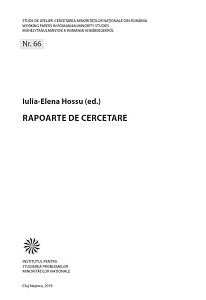
This working paper is the first from a series of studies which is proposing to publish the summary reports of field research carried out by the researchers of the institute within different research projects in which they`ve been involved.
More...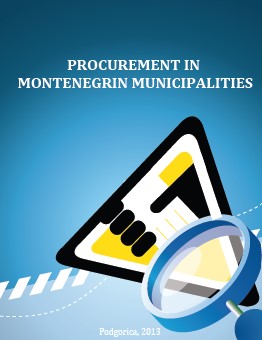
Keywords: Public procurement in Montenegro; Montenegrin municipalities; transparency; State Audit Institution;
A year-long research on the risks of corruption in public procurement procedures in Montenegrin municipalities was conducted within the project Corruption at the Local Level- Zero Tolerance. Among other things, the project entails monitoring of local action plans for fight against corruption in 14 municipalities, as well as development of a study of practical policies in six areas of high risk for corruption. The analysis Procurement in Montenegrin municipalities represents both a continuation of the research activities of the Institute Alternative in the field of public procurement during which several practical policy proposals have been made in the light of improving the legal and institutional framework and overcoming the problems in practice, as well as a guide for a more effective monitoring of public procurement by the Parliament of Montenegro.
More...
Keywords: BiH; minorities; Roma; security; judiciary; institutions; access; trust;
Na popisu iz 2013. godine 12.583 osobe izjasnile su se kao Romi i Romkinje, dok su 252 osobe iskoristile drugačije termine, poput „bošnjački Rom“, „Ciganin“, „muslimanski Rom“, „bijeli Rom“ itd., dok se dvanaest osoba izjasnilo kao Egipćani. Procjene o broju Roma koji žive u Bosni i Hercegovini ne podudaraju se sa zvaničnim podacima popisa. Ministarstvo za ljudska prava i izbjeglice Bosne i Hercegovine procjenjuje da u državi živi najmanje 25.000 do 30.000 Roma. Međunarodne i lokalne nevladine organizacije u Bosni i Hercegovini iz godine u godinu izvještavaju o sistemskoj, višestrukoj i višegeneracijskoj isključenost romske populacije koja ostavlja snažne posljedice na kvalitetu života velikog broja Roma u Bosni i Hercegovini. Romska populacija susreće se s velikom stopom nezaposlenosti, lošim stambenim uslovima i diskriminacijom u institucijama i javnom životu. Izuzetno mali broj Roma radi u policiji i drugim javnim ustanovama, dok se samo jedna sutkinja u Bosni i Hercegovini izjašnjava kao Romkinja. Nije zvanično utvrđeno koliko Roma u Bosni i Hercegovini ne posjeduju lične dokumente, čime im se ograničava pristup građanskim, političkim, socijalnim, ekonomskim i kulturnim pravima. Nemogućnost pribavljanja dokumenata povezana je sa siromaštvom i niskim društvenim statusom romskih zajednica, što vodi daljnjoj isključenosti iz javnog života. Romi nailaze na brojne prepreke u ostvarivanju pristupa osnovnom i srednjem obrazovanju, jer često romske porodice ne mogu platiti troškove školovanja djece. Romi i sami nerijetko odustaju od školovanja zbog diskriminacije. Istraživanja provedena u Bosni i Hercegovini tokom protekle decenije pokazala su da patrijarhalni stavovi i niži stepen obrazovanja Romkinja u odnosu na muškarce sunarodnjake imaju veliki uticaj na nizak standard i izloženost Romkinja nasilju i diskriminaciji i unutar i van svojih zajednica. Aktivnosti koje provode institucije usmjerene na zapošljavanje, obrazovanje, stambeno zbrinjavanje i zdravstvenu zaštitu često ne daju odgovarajuće rezultate; nekada aktivnosti nisu adekvatno usklađene s potrebama, a nekada izostaje praćenje i održivost pojedinih aktivnosti. Atlantska inicijativa provela je istraživanje u periodu od aprila do juna 2020. godine s osnovnim ciljem da istraži stavove romske populacije kada je riječ o pristupu i povjerenju Roma u institucije sigurnosti i pravosuđa. Studija osigurava uvid u probleme s kojima se susreću Romi i Romkinje u kontaktu s pravosudnim sistemom. Polazeći od rezultata istraživanja, formulirali smo preporuke za unapređenje položaja Roma neophodne za jačanje povjerenja između romske populacije i institucija u Bosni i Hercegovini. Identificirane su prepreke izgradnji povjerenja Roma u pravosudne institucije, kao i specifični problemi i potrebe kada je riječ o pristupu Romkinja pravosudnim institucijama. Istraživanje je zamišljeno i kao podsticaj bosanskohercegovačkim institucijama i međunarodnim organizacijama da, polazeći od specifičnih potreba romske populacije, omoguće bolji i ravnopravan pristup Roma i Romkinja pravosudnom sistemu. Metode koje su primijenjene u istraživanju uključuju normativnu analizu važećih domaćih i međunarodnih propisa, analizu postojeće literature i provedenih istraživanja te prikupljanje podataka putem polustrukturiranih i strukturiranih intervjua s Romima i predstavnicima/cama pravosudnih institucija u Bosni i Hercegovini. Iako je inicijalno predviđeno da istraživanje uključi veći broj detaljnih intervjua, od predviđenog broja intervjua se moralo odustati uslijed početka pandemije izazvane virusom bolesti COVID-19. Mogućnost provođenja online intervjua i fokus grupa, nakon konsultacija s predstavnicima romskog Udruženja „Kali Sara“, nije uzeta u razmatranje zbog slabijeg pristupa sredstvima internetske komunikacije većine Roma. Ankete, iako predstavljaju mišljenje ograničenog uzorka romske populacije, pružaju uvid u veoma složenu temu pristupa Roma pravosuđu. Kreiranju ankete istraživačice su prišle sa stanovišta da su Romi ugroženi kada je riječ o pristupu javnim institucijama zbog sistemske diskriminacije i isključenosti iz društvenih tokova. Romske nevladine organizacije, s kojima je Atlantska inicijativa imala priliku da sarađuje, navode da opća populacija, kao i osobe koje rade s Romima, nerijetko imaju implicitne predrasude kojih nisu svjesni i da je potrebno ozbiljno i sistemsko tretiranje anticiganizma u Bosni i Hercegovini, odnosno višestruke, dugotrajne diskriminacije, predrasuda i pogrešnih stavova o Romima, što je česta pojava u BiH i drugim zemljama Zapadnog Balkana i Evrope. U vezi s navedenim, a u cilju stvaranja atmosfere povjerenja tokom provođenja istraživanja, Atlantska inicijativa i Udruženje „Kali Sara“ donijeli su odluku da istraživači na terenu budu Romi kako bi se ostvario viši stepen povjerenja u istraživače i dobile što preciznije informacije. Sudije koje su zaposlene na različitim referatima i lokacijama i koje imaju profesionalno iskustvo u radu s Romima odgovarale su na otvorene upitnike koji su im dostavljeni putem elektronske pošte. Osim svojih ličnih iskustava i stavova, sudije su adresirale i pitanja općih stavova prema problemima pristupa i povjerenja Roma prema pravosudnim institucijama. Metode istraživanja, lokacije na kojima je istraživanje rađeno, kao i usaglašavanje upitnika proces je koji je usaglašavan između Atlantske inicijative i Udruženja „Kali Sara“. Interpretaciju i analizu rezultata uradile su istraživačice Atlantske inicijative. Osobe s kojima su obavljeni polustrukturirani intervjui pripadaju različitim starosnim i socioekonomskim skupinama i žive na različitim lokacijama u Bosni i Hercegovini. Romi koji su učestvovali u istraživanju podijeljeni su u dvije kategorije: Romi angažirani u nevladinim organizacijama (11 učesnika/ca) i Romi koji nisu uključeni u rad organizacija i nisu aktivni u javnom i/ili političkom životu (136 učesnika/ca). Od navedenog broja u istraživanju je učestvovalo 73 posto muškaraca i 27 posto žena, što dovodi do problematizacije omjera žena i muškaraca koji su obuhvaćeni istraživanjem. Ukupno sedam sudija dalo je odgovore na pitanja koja su se odnosila na pristup Roma institucijama pravosuđa. Istraživanjem su obuhvaćena ukupno 154 ispitanika. Kada govorimo o metodološkim ograničenjima ovog istraživanja, primarno moramo spomenuti ograničen broj intervjuiranih Roma te da se nalazi istraživanja ne mogu generalizirati za cijelu romsku populaciju. Uprkos ograničenjima, studija obezbjeđuje uvid u probleme s kojima se susreću Romi i Romkinje u kontaktu s pravosudnim sistemom.
More...